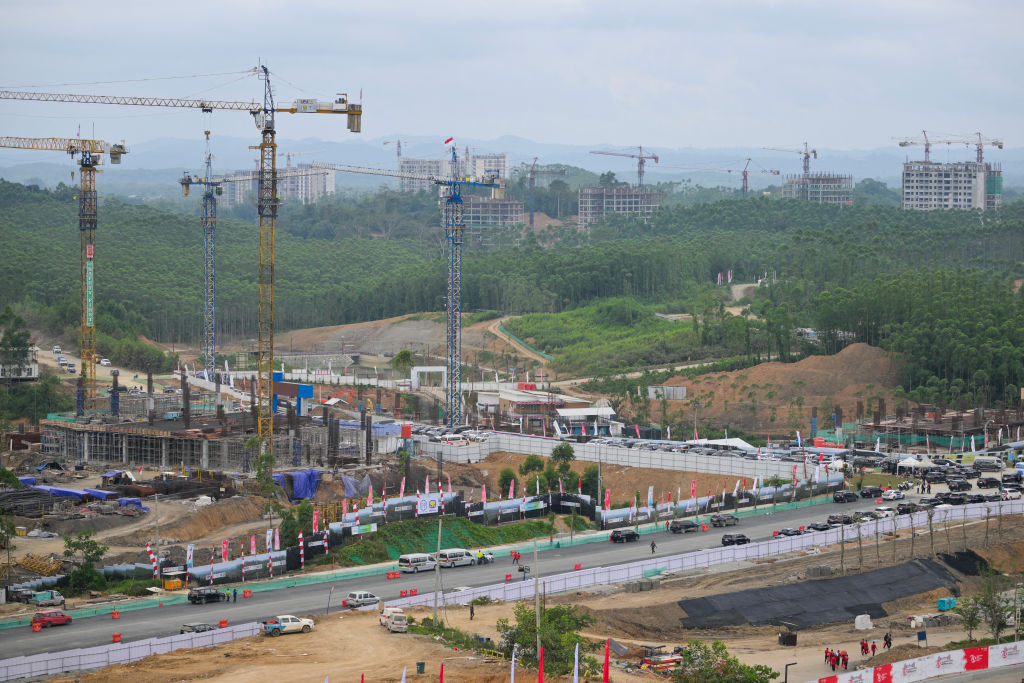Indonesia’s new $30 billion capital city is hit by 'delays'
What is causing the delays in Indonesia’s new capital city and when will it be complete?


Get the latest financial news, insights and expert analysis from our award-winning MoneyWeek team, to help you understand what really matters when it comes to your finances.
You are now subscribed
Your newsletter sign-up was successful
Want to add more newsletters?

Twice daily
MoneyWeek
Get the latest financial news, insights and expert analysis from our award-winning MoneyWeek team, to help you understand what really matters when it comes to your finances.

Four times a week
Look After My Bills
Sign up to our free money-saving newsletter, filled with the latest news and expert advice to help you find the best tips and deals for managing your bills. Start saving today!
Indonesia’s first planned independence day celebrations at its multi-billion-dollar new capital city were a damp squib, say A. Anantha Lakshmi and Diana Mariska in the Financial Times. The government was forced into an “embarrassing climbdown” and had to scale back plans and withdraw invitations to foreign dignitaries as it became obvious the new city would not be ready on time.
What's causing Indonesia's new capital to be delayed?
Nusantara, a “legacy project” of the outgoing president Joko Widodo (known as Jokowi), is being carved out of the jungle in Borneo at an estimated cost of $30 billion, but has been “beset by delays, land acquisition problems and an absence of foreign investors”. That shouldn’t be a surprise, says Daniel Moss on Bloomberg.
Capital cities develop slowly over decades, perhaps centuries, and “economics has an annoying habit of intruding” on the dreams of those in a rush to create them. Erecting a city from scratch in an equatorial forest was “always going to be arduous”.
MoneyWeek
Subscribe to MoneyWeek today and get your first six magazine issues absolutely FREE

Sign up to Money Morning
Don't miss the latest investment and personal finances news, market analysis, plus money-saving tips with our free twice-daily newsletter
Don't miss the latest investment and personal finances news, market analysis, plus money-saving tips with our free twice-daily newsletter
During a visit 18 months ago, actual construction work was not much in evidence. The roads leading to the nearest urban area, Balikpapan, were narrow. And “looming over the project” is the approaching end of Jokowi’s second term in October. His successor, Prabowo Subianto, says he is committed to Nusantara. But the capital “isn’t coming cheap and Prabowo has plenty of his own grand plans”.
Meanwhile, Jakarta, the current capital, is sinking, says The Economist. No big city in the world faces more climate-related threats and some parts could be submerged by 2050.
But Nusantara’s triumph is far from inevitable. The distance between the two cities is about 800 miles and it will be a big ask for people to up sticks and move there. When fully completed in 2045, Nusantara was supposed to mark Indonesia’s arrival as a developed country. For now, it remains an open question whether Nusantara is “a giant vanity project doomed to fail”.
This article was first published in MoneyWeek's magazine. Enjoy exclusive early access to news, opinion and analysis from our team of financial experts with a MoneyWeek subscription.
Get the latest financial news, insights and expert analysis from our award-winning MoneyWeek team, to help you understand what really matters when it comes to your finances.

Stuart graduated from the University of Leeds with an honours degree in biochemistry and molecular biology, and from Bath Spa University College with a postgraduate diploma in creative writing.
He started his career in journalism working on newspapers and magazines for the medical profession before joining MoneyWeek shortly after its first issue appeared in November 2000. He has worked for the magazine ever since, and is now the comment editor.
He has long had an interest in political economy and philosophy and writes occasional think pieces on this theme for the magazine, as well as a weekly round up of the best blogs in finance.
His work has appeared in The Lancet and The Idler and in numerous other small-press and online publications.
-
 Early signs of the AI apocalypse?
Early signs of the AI apocalypse?Uncertainty is rife as investors question what the impact of AI will be.
-
 Reach for the stars to boost Britain's space industry
Reach for the stars to boost Britain's space industryopinion We can’t afford to neglect Britain's space industry. Unfortunately, the government is taking completely the wrong approach, says Matthew Lynn
-
 Reach for the stars to boost Britain's space industry
Reach for the stars to boost Britain's space industryopinion We can’t afford to neglect Britain's space industry. Unfortunately, the government is taking completely the wrong approach, says Matthew Lynn
-
 "Botched" Brexit: should Britain rejoin the EU?
"Botched" Brexit: should Britain rejoin the EU?Brexit did not go perfectly nor disastrously. It’s not worth continuing the fight over the issue, says Julian Jessop
-
 'AI is the real deal – it will change our world in more ways than we can imagine'
'AI is the real deal – it will change our world in more ways than we can imagine'Interview Rob Arnott of Research Affiliates talks to Andrew Van Sickle about the AI bubble, the impact of tariffs on inflation and the outlook for gold and China
-
 Tony Blair's terrible legacy sees Britain still suffering
Tony Blair's terrible legacy sees Britain still sufferingOpinion Max King highlights ten ways in which Tony Blair's government sowed the seeds of Britain’s subsequent poor performance and many of its current problems
-
 How a dovish Federal Reserve could affect you
How a dovish Federal Reserve could affect youTrump’s pick for the US Federal Reserve is not so much of a yes-man as his rival, but interest rates will still come down quickly, says Cris Sholto Heaton
-
 New Federal Reserve chair Kevin Warsh has his work cut out
New Federal Reserve chair Kevin Warsh has his work cut outOpinion Kevin Warsh must make it clear that he, not Trump, is in charge at the Fed. If he doesn't, the US dollar and Treasury bills sell-off will start all over again
-
 How Canada's Mark Carney is taking on Donald Trump
How Canada's Mark Carney is taking on Donald TrumpCanada has been in Donald Trump’s crosshairs ever since he took power and, under PM Mark Carney, is seeking strategies to cope and thrive. How’s he doing?
-
 Rachel Reeves is rediscovering the Laffer curve
Rachel Reeves is rediscovering the Laffer curveOpinion If you keep raising taxes, at some point, you start to bring in less revenue. Rachel Reeves has shown the way, says Matthew Lynn